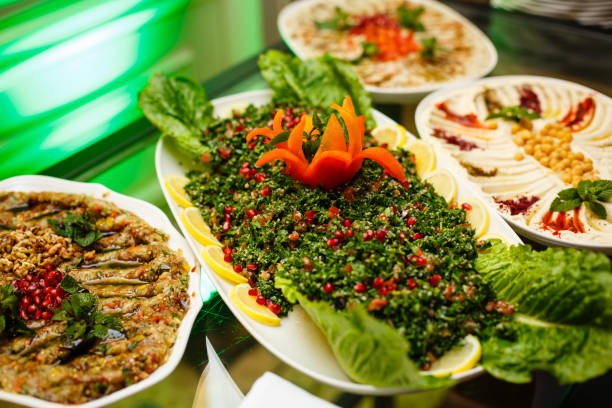Introduction: Exploring the tastes of Iraq
Iraq’s cuisine is a fusion of Middle Eastern flavors and influences from its neighboring countries, such as Turkey and Iran. With its rich history and diverse culture, it’s no surprise that Iraq has a unique food culture that’s worth exploring. If you’re planning to visit Iraq, you won’t want to miss out on trying some of the country’s most delicious dishes. From traditional breakfast dishes to decadent desserts, there’s something for everyone to enjoy.
Traditional Iraqi breakfast dishes to try
Breakfast is an important meal in Iraq and is often served with a variety of dishes to choose from. One of the most popular breakfast dishes is called “foul medames,” which is a stew made of fava beans and served with olive oil, lemon juice, and spices. Another must-try dish is “masgouf,” which is a grilled fish that’s often served at breakfast and seasoned with salt, pepper, and lemon juice. If you have a sweet tooth, you can try “kleicha,” a pastry stuffed with dates and spices.
Delicious appetizers to start your meal
Iraqi cuisine is known for its flavorful appetizers, which are perfect for starting your meal. One of the most popular appetizers is “hummas,” a creamy dip made of chickpeas, tahini, and olive oil. Another popular dish is “kubba,” a fried croquette filled with minced meat, onions, and spices. “Sambusa” is also a must-try appetizer that’s similar to samosas, but with a spicier filling of minced meat or vegetables.
Main courses that represent Iraqi cuisine
Iraqi cuisine has a variety of main courses that represent its rich culinary tradition. “Biryani” is a popular rice dish that’s cooked with meat, vegetables, and spices. “Ghormeh Sabzi” is a stew made of herbs, vegetables, and meat that’s simmered for hours to create a rich flavor. “Kebab” is also a popular dish that’s made of grilled meat that’s marinated in spices and served with rice.
Satisfy your sweet tooth with Iraqi desserts
If you have a sweet tooth, you won’t be disappointed with the selection of desserts in Iraq. “Kunafa” is a traditional sweet made of shredded pastry that’s filled with cheese and soaked in syrup. “Znoud el-Sit” is another popular dessert that’s made of a thin layer of pastry filled with cream and soaked in syrup. “Halawa” is a sweet made of sesame paste and sugar that’s often served with tea.
Drinks that are a must-try in Iraq
To wash down your meal, you can try some of Iraq’s popular drinks. “Chai” is a popular tea that’s often served with breakfast or after meals. “Arak” is a liquor made of anise that’s often served with mezze dishes. “Jallab” is a sweet drink made of dates, grape molasses, and rose water that’s perfect for quenching your thirst on a hot day.
In conclusion, Iraqi cuisine is rich in flavors and traditions that are worth exploring. From traditional breakfast dishes to savory main courses and decadent desserts, there’s something for everyone to enjoy. Don’t forget to try some of Iraq’s popular appetizers and drinks to complete your culinary journey.

